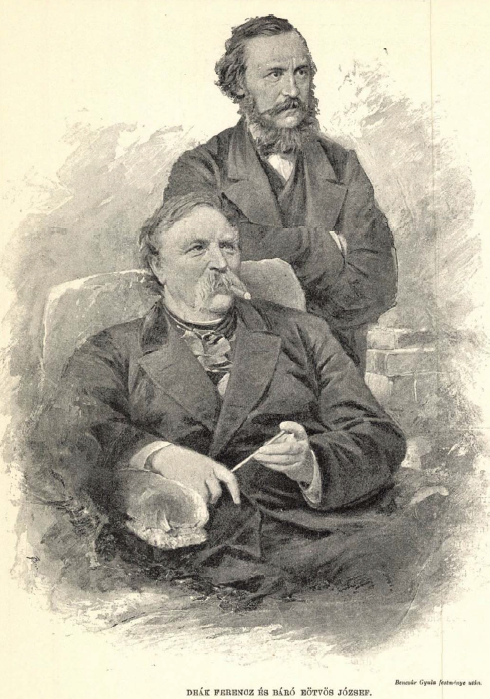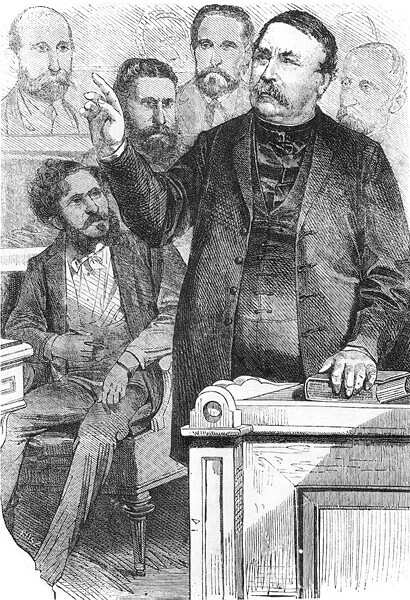An act that made nationality rights an integral part of the Constitution for the first time in Central Europe. On 24 November 1868, Ferenc Deák submitted his Bill on Nationalities to the National Assembly
"Time is short; I will not waste this time with a long oratory; I simply say that I firmly believe that there is one political nation in Hungary: the united, indivisible Hungarian nation, of which all citizens, whatever their nationality, are equal members."
[1] With these words, among others, Ferenc Deák submitted his bill on nationalities to the national Assembly on 24 November 1868. The "sage of the nation", the ultimate author of Act XLIV of 1868, sought a political basis for the nationality law in the absence of the institution of the nation-state.[2]

In November 1868, during the debate on the nationality bill, three positions emerged. According to the representatives of the national minorities, it was desirable that "the political equality of nationality and language for the "peoples" of Hungary should be guaranteed by constitutional law within the limits of the territorial integrity and political unity of the state." [3] The proposal called the six largest nationalities living in Hungary "national nationalities" and demanded a certain collective autonomy for them through the county system “rounded" according to nationality relations. [4] Sándor Mocsonyi, representative of the Romanian nationality, stated in the debate on the bill on 24 November 1868: the modern idea of nationality is incomprehensible without the people' sovereignty and equality recognized within the framework of the nation-state. [5] Baron József Eötvös, Minister for Religion and Public Education, was involved in the debate as the draftsman of the other draft bill, the one submitted by the Central Committee, and as an expert on the nationality question.[6] The Minister of Culture did not agree with the minority proposal. In his view, it would have preserved national diversity, which, in his opinion, was disappearing throughout Europe.[7] His main objection was that an administration based on rounded counties would prevent assimilation.[8] Eötvös' position (the proposal of the Central Committee) avoided any reference to the specific Hungarian political world serving as the interpretative domain of the nationality question.[9] The settlement of the Hungarian nationality question would have followed the logic of the nationality issues of the whole empire. The text of the draft law took it as a matter of evidence that the official language of the country was Hungarian, and the draft identified the state with the "state government". Ferenc Deák's answer to the question was entirely unique. In his speech of 24 November 1868, already mentioned above, he completely ignored the minority proposal; regarding Eötvös' position, he said that while he agreed with many of its points, there were several others with which he disagreed. The "sage of the fatherland" enacted the principle of "a single political nation". As he said in his speech before the introduction of the law, "All the citizens of Hungary, according to the principles of the Constitution, form a single nation in political terms, the indivisible united Hungarian nation, of which every citizen, of whatever nationality, is an equal member."[10] József Eötvös did not defend his own position. He accepted Deák's proposal in its entirety "as in principle identical with the proposal of the majority of the Central Committee."[11]

The Nationality Act (Act XLIV of 1868) was basically a liberal piece of legislation. The law ensured the wide use of non-Hungarian languages. All residents could submit their petitions to the municipalities, counties, public bodies and the government in their mother tongue, and they also had to receive a reply in their mother tongue. Similar possibilities were created for the use of the (freely chosen) language of administration of the municipalities. Churches, ecclesiastical authorities and their institutions were allowed to use the mother tongue without any obligation. Thus, municipalities, churches and private individuals could choose the language of instruction in their schools, while the law also made it partly the duty of the state to provide education at secondary level in the languages of the nationalities.[12] One of its most important measures stated that "for the purpose of establishing other institutions for the promotion of the language, art, science, economy, industry and commerce, individual citizens... may form associations or societies... may collect funds and manage them in accordance with their legal needs as nationalities under the supervision of the state government".[13] Even in its final wording, the law reflected the liberal thinking of the leading reformists, who did not see further development as a single track, but wished to allow for several alternatives to the development of the national issue, with obvious restrictions.[14] It cannot be said that the law did not grant collective rights to nationalities, though it was primarily based on full individual and cultural freedom. But because it lacked recognition of the separate political identity of the individual nationalities, it seemed unacceptable to the majority of nationality politicians.
Article XLIV of 1868 was the first piece of legislation in force not only in Hungary, but also in Central Europe, which made nationality rights an integral part of the constitution, consolidated into a single article.[15] This law is also unique in terms of the lifespan of nationality legislation, since for a long time it was the basis for the relationship of nationalities to the Hungarian state, despite the fact that in the meantime the territory and population of the country underwent such enforced changes, which is also unprecedented in Central Europe.[16]
Literature
- Deák Ferenc: Válogatott politikai írások és beszédek II. kötet 1850-1873. Osiris Kiadó, Budapest, 2001. Válogatta, sajtó alá rendezte és a jegyzeteket írta Deák Ágnes.
Also available at: https://www.arcanum.com/hu/online-kiadvanyok/Deak-deak-ferenc-munkai-8751/deak-ferenc-valogatott-politikai-irasok-es-beszedek-6973/ii-kotet-18501873-7510/x-fejezet-a-kiegyezes-megallapodas-1865-1868-7BF9/kepviselohazi-beszed-a-nemzetisegi-torvenyjavaslat-vitajaban-pest-1868-november-24-8164/ date of download: 15 November 2022
- Gángó Gábor: Az 1868. évi nemzetiségi törvény és következményei. In: Magyar Kisebbség évf. (2009) 1-2. (51-52.) sz. 9–16.
- Kemény G. Gábor: Iratok a nemzetiségi kérdés történetéhez Magyarországon a dualizmus korában. I kötet: 1867–1892. Tankönyvkiadó, Budapest, 1952. 5.; 140–141.
- Mikó Imre: Nemzetiségi jog és nemzetiségi politika. Tanulmányok a magyar közjog és politikai történet köréből. Kolozsvár (Minerva), 1944. 3.; 505.
- Szász Zoltán: Politikai élet és nemzetiségi kérdés a dualizmus korában (1867–1918). In: Szász Zoltán (szerk.): Erdély története III. Budapest (Akadémiai Kiadó), 1988. 1629.
[1] Deák 2001.
[2] Gángó 2009. 9.
[3] Kemény 1952. 5.
[4] Gángó 2009. 9.
[5] Ibid.
[6] Ibid.
[7] Kemény 1952. 140–141.
[8] Gángó 2009. 10.
[9] Ibid.
[10] Ibid.
[11] Ibid.
[12] Szász 1986. 1629.
[13] Article 26 of Act XLIV of 1868 (on the equality of nationalities). See also: Mikó 1944. 505.
[14] Szász 1986. 1629.
[15] Mikó 1944. 3.
[16] Ibid.